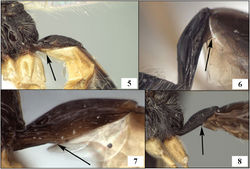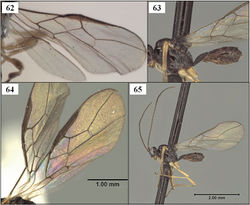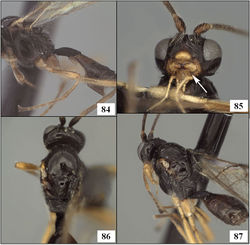Tubiformopius tubigaster
| Notice: | This page is derived from the original publication listed below, whose author(s) should always be credited. Further contributors may edit and improve the content of this page and, consequently, need to be credited as well (see page history). Any assessment of factual correctness requires a careful review of the original article as well as of subsequent contributions.
If you are uncertain whether your planned contribution is correct or not, we suggest that you use the associated discussion page instead of editing the page directly. This page should be cited as follows (rationale):
Citation formats to copy and paste
BibTeX: @article{Wharton2012ZooKeys243, RIS/ Endnote: TY - JOUR Wikipedia/ Citizendium: <ref name="Wharton2012ZooKeys243">{{Citation See also the citation download page at the journal. |
Ordo: Hymenoptera
Familia: Braconidae
Genus: Tubiformopius
Name
Tubiformopius tubigaster Fischer stat. rev. – Wikispecies link – Pensoft Profile
- Opius tubigaster Fischer, 1968: 463–464, 483–485. Holotype male AEIC.
- Opius (Allophlebus) tubigaster: Fischer 1977[1]: 223, 248–249 (key, redescription).
- Tubiformopius tubigaster: Fischer 1998[2]: 26.
- Lorenzopius tubigaster: Fischer 1999[3]: 282; Yu et al. 2005[4], 2012[5] (electronic catalogs).
Type locality
Ecuador, Cerro Tinajillas, 3200 m.
Type material
Holotype. Male (AEIC), first label, first line: Cerro Tinajillas second line: 3200m Ecuador third line: III. 18–21. 65 fourth line: Luis Peña second label [purple]: Holotype third label, first line: Opius [male symbol] second line: tubigaster third line: det Fischer sp. n. fourth label: first line: Type no. second line: 589
Diagnosis
Holotype male. Labrum partly concealed by mandibles (Fig. 85); clypeus nearly twice as wide as tall, protruding in profile, ventral margin truncate to very weakly concave. Mandible with basal lobe, apically nearly parallel-sided. Malar space distinct, malar sulcus not evident except as a small impression adjacent eye. Antenna with 26 flagellomeres. Pronotum dorsally not readily visible in holotype. Disc of mesoscutum nearly bare, with a sparse row of setae between notauli and transscutal articulation; midpit completely absent; notauli weak, present as very short, unsculptured grooves on anterior declivity, not extending posteriorly onto disc of mesoscutum; supra-marginal carina between base of notaulus and tegula absent. Scuto-scutellar sulcus relatively narrow (Figs 86, 87), crenulate throughout. Precoxal sulcus indistinct, short, broad, very shallow, completely unsculptured. Propodeum granular rugose, without median carina anteriorly, moderately setose. Fore wing stigma long, curled in holotype, but appears to be very gradually tapered distally; r1 equal to or slightly longer than stigma width; second submarginal cell long, distinctly narrowing distally; m-cu widely antefurcal (Fig. 63, 65); 2CUb arising about middle of hind margin of first subdiscal cell, 2cu-a absent, first subdiscal cell broadly open at posterior-distal corner. Hind coxa smooth; hind femur very long, slender, weakly bilobed. T1 (Figs 63, 65, 86, 87) completely striate, the striae curving medially from basal-lateral area adjacent dorsal tendon attachment, completely obscuring dorsal and lateral carinae; dorsope and laterope absent; T1 spiracle indistinct, situated posteriad midlength of T1; T1 nearly parallel-sided, 2.1 × longer than apical width; S1 appears fused to T1; S1 0.5 × length of T1.
Remarks. This species is very similar to Tubiformopius tubibasis, but differs in having a little more of the labrum exposed between the apex of the clypeus and the tightly closed mandibles. The hind coxae are yellow in Tubiformopius tubigaster and distinctly infumate in Tubiformopius tubibasis. Both species were described from Ecuador.
Taxon Treatment
- Wharton, R; Ward, L; Miko, I; 2012: New neotropical species of Opiinae (Hymenoptera, Braconidae) reared from fruit-infesting and leaf-mining Tephritidae (Diptera) with comments on the Diachasmimorpha mexicana species group and the genera Lorenzopius and Tubiformopius ZooKeys, 243: 27-82. doi
Other References
- ↑ Fischer M (1977) Hymenoptera, Braconidae (Opiinae II-Amerika). Das Tierreich 96: 1-1001.
- ↑ Fischer M (1998) Neue taxonomische Untersuchungen ueber Madenwespen der Alten Welt mit besonderer Beruecksichtigung der Gattungen Eurytenes Foerster, Aulonotus Ashmead, Biosteres Foerster und der Untergattung Gastrosema Fischer (Hymenoptera, Braconidae: Opiinae). Linzer Biologische Beitraege 30: 21-51.
- ↑ Fischer M (1999) Zur Evolution und zum System der Opius-verwandten Gattungen der Unterfamilie Opiinae mit einer erwiterten Aufteilung dieses Gattungs-Komplexes (Hymenoptera, Bracondiae, Opiinae). Linzer Biologische Beitraege 31: 277-336.
- ↑ Yu D, Van Achterberg K, Horstmann K (2005) World Ichneumonoidea 2004. Taxonomy, biology, morphology and distribution. Taxapad 2005. CD/DVD. Taxapad, Vancouver, http://www.taxapad.com
- ↑ Yu D, Van Achterberg C, Horstmann K (2012) Taxapad 2012 – World Ichneumonoidea 2011. Taxonomy, biology, morphology and distribution. On USB Flash http://drive.www.taxapad.com, Ontario.
Images
|


